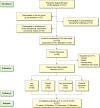Assessing the effect of culturally specific audiovisual educational interventions on attaining self-management skills for chronic obstructive pulmonary disease in Mandarin- and Cantonese-speaking patients: a randomized controlled trial
- PMID: 27536093
- PMCID: PMC4976815
- DOI: 10.2147/COPD.S105408
Assessing the effect of culturally specific audiovisual educational interventions on attaining self-management skills for chronic obstructive pulmonary disease in Mandarin- and Cantonese-speaking patients: a randomized controlled trial
Abstract
Background: Patient education is a key component in the management of chronic obstructive pulmonary disease (COPD). Delivering effective education to ethnic groups with COPD is a challenge. The objective of this study was to develop and assess the effectiveness of culturally and linguistically specific audiovisual educational materials in supporting self-management practices in Mandarin- and Cantonese-speaking patients.
Methods: Educational materials were developed using participatory approach (patients involved in the development and pilot test of educational materials), followed by a randomized controlled trial that assigned 91 patients to three intervention groups with audiovisual educational interventions and one control group (pamphlet). The patients were recruited from outpatient clinics. The primary outcomes were improved inhaler technique and perceived self-efficacy to manage COPD. The secondary outcome was improved patient understanding of pulmonary rehabilitation procedures.
Results: Subjects in all three intervention groups, compared with control subjects, demonstrated postintervention improvements in inhaler technique (P<0.001), preparedness to manage a COPD exacerbation (P<0.01), ability to achieve goals in managing COPD (P<0.01), and understanding pulmonary rehabilitation procedures (P<0.05).
Conclusion: Culturally appropriate educational interventions designed specifically to meet the needs of Mandarin and Cantonese COPD patients are associated with significantly better understanding of self-management practices. Self-management education led to improved proper use of medications, ability to manage COPD exacerbations, and ability to achieve goals in managing COPD.
Clinical implication: A relatively simple culturally appropriate disease management education intervention improved inhaler techniques and self-management practices. Further research is needed to assess the effectiveness of self-management education on behavioral change and patient empowerment strategies.
Keywords: COPD; Chinese community; cultural background; educational material; self-efficacy; self-management.
Figures
References
-
- Pauwels RA, Buist AS, Calverley PM, Jenkins CR, Hurd SS. Global strategy for the diagnosis, management, and prevention of chronic obstructive pulmonary disease. NHLBI/WHO Global Initiative for Chronic Obstructive Lung Disease (GOLD) Workshop summary. Am J Respir Cri Care Med. 2001;163:1256–1276. - PubMed
-
- Buist AS, Vollmer WM, McBurnie MA. Worldwide burden of COPD in high- and low-income countries. Part I. The burden of obstructive lung disease (BOLD) initiative. Int J Tuberc Lung Dis. 2008;12:703–708. - PubMed
-
- Chapman KR, Mannino DM, Soriano JB, et al. Epidemiology and costs of chronic obstructive pulmonary disease. Eur Respir J. 2006;27:188–207. - PubMed
-
- Effing TW, Bourbeau J, Vercoulen J, et al. Self-management programs for COPD: moving forward. Chronic Respir Dis. 2012;9:27–35. - PubMed
Publication types
MeSH terms
Substances
LinkOut - more resources
Full Text Sources
Other Literature Sources
Medical


